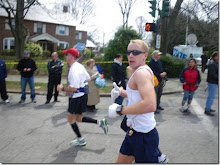We often tell ourselves that we can't go faster (even though we probably can). But there's a better lie we can tell ourselves that would make us just a little bit better. In a recent article from the New York Times, Gina Kolata describes how a little deception could help endurance athletes break free from their self-imposed restrictions and become better runners.
During a laboratory experiment, a field of cyclists were pushed to their limits on a stationary bicycle only to discover that an avatar could push them a little faster than they normally would by themselves. The trick was that the cyclists were told that the avatar was riding at their own maximum speed, however, it was actually traveling slightly faster than the cyclists' previous fastest time. Was the avatar forcing them to compete at a higher level?
In an another experiment, cyclists were broken up into two separate groups. In one group they were told that the avatars would be traveling faster than the cyclists ever had. That group of individuals gave up from the beginning. In the second group was told that the avatar was going the same speed, even though they were going a little more than slightly faster than the previous experiment. This group fared much better than the other group by hanging onto the same speed as the avatar.
It appears that the brain allows "athletes to tap more deeply into energy stores than would ordinarily be permitted." Exercise physiologists had always believed that the heart, lungs, muscle, etc. were the most important factors in regulating speed, but maybe they were focusing on the wrong part of the body. Maybe it's the brain that should be further investigated. Perhaps the brain should be trained as vigorously as the muscles, heart and lungs.
In the experiment, the small deceptions of the mind seemed to have a positive effect on speed. Sometimes a little white can't hurt, and sometimes it just may help.
http://www.nytimes.com/2011/09/20/health/nutrition/20best.html?pagewanted=2&ref=health


No comments:
Post a Comment